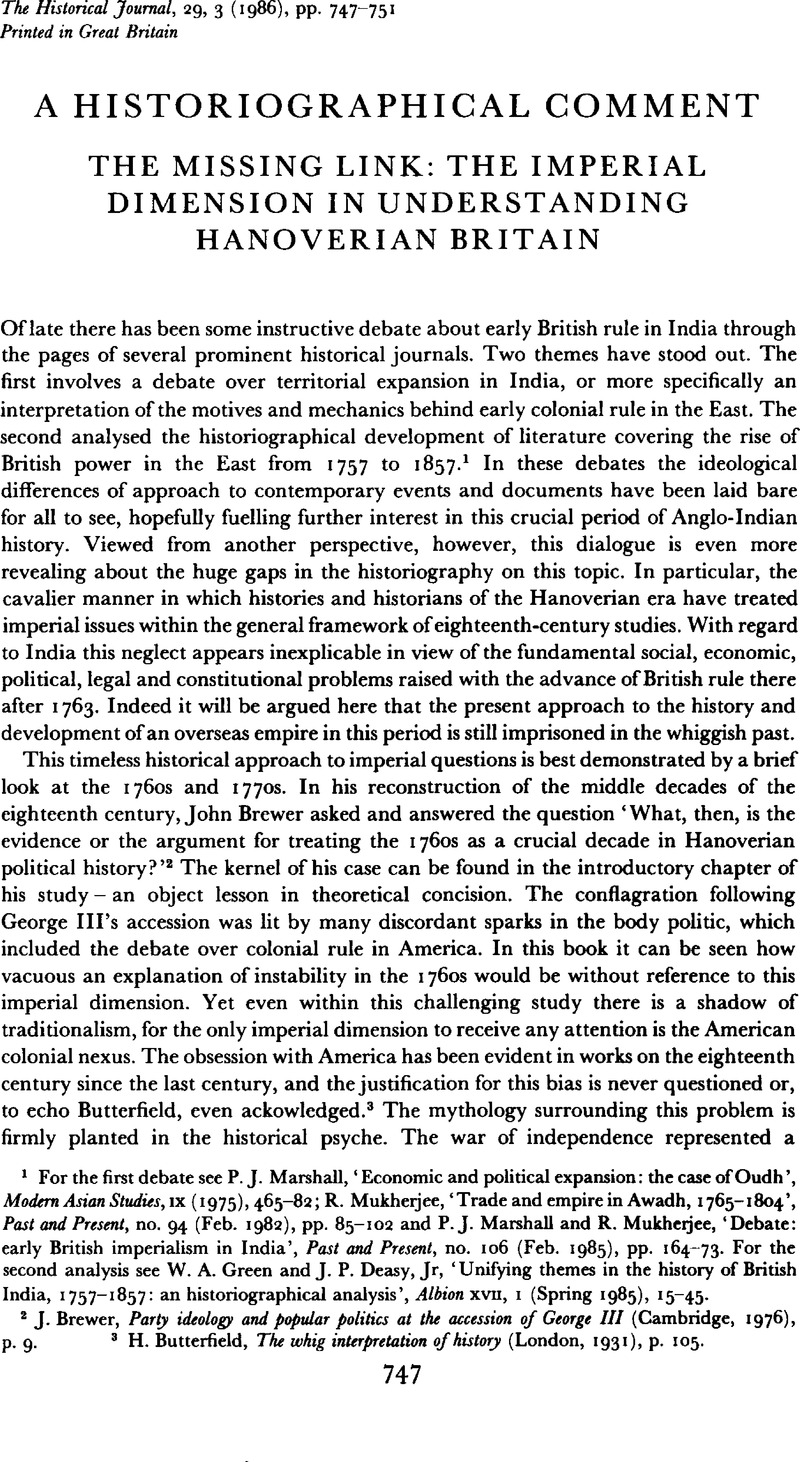Published online by Cambridge University Press: 11 February 2009

1 For the first debate see Marshall, P. J., ‘Economic and political expansion: the case of Oudh’, Modern Asian Studies, IX (1975), 465–82CrossRefGoogle Scholar; Mukherjee, R., ‘Trade and empire in Awadh, 1765–1804’, Past and Present, no. 94 (02 1982), pp. 85–102CrossRefGoogle Scholar and Marshall, P. J. and Mukherjee, R., ‘Debate: early British imperialism in India’, Past and Present, no. 106 (02 1985), pp. 164–73CrossRefGoogle Scholar. For the second analysis see Green, W. A. and Deasy, J. P. Jr, ‘Unifying themes in the history of British India, 1757–1857: an historiographical analysis’, Albion XVII, 1 (Spring 1985), 15–45CrossRefGoogle Scholar.
2 Brewer, J., Party ideology and popular politics at the accession of George III (Cambridge, 1976), p. 9CrossRefGoogle Scholar.
3 Butterfield, H., The whig interpretation of history (London, 1931), p. 105Google Scholar.
4 Harlow, V. T., The founding of the second British empire (London, 2 vols. 1952–1965)Google Scholar.
5 Namier, L. B., England in the age of the American Revolution (London, 1930)Google Scholar, and, for example, Guttridge, G. H., English whiggism and the American Revolution (U.C.L.A. Press, 1963)Google Scholar, Donoughue, B., British politics and the American Revolution: the path to war, 1773–1775 (London, 1964)Google Scholar; Derry, J., English politics and the American Revolution (London, 1976)Google Scholar.
6 Sellars, W. C. and Yeatman, R. J., 1066 and all that (New York, 1931), p. 115Google Scholar.
7 (Oxford, 1952.)
8 This is more fully explained in Lenman, B. and Lawson, P., ‘Robert Clive, the “Black Jagir’, and British polities’, Historical Journal, XXVI, 4 (1983), 801–3CrossRefGoogle Scholar.
9 See, for example, the published fruits of Bowen's, H. V. research on the East India Company in the mid-eighteenth century: ‘Dipped in the traffic: East Indian stockholders in the House of Commons, 1768–1774’, Parliamentary History yearbook, forthcoming 1986Google Scholar; ‘The East India Company and military recruitment in Britain, 1763–71’, Bulletin of the Institute of Historical Research, forthcoming. And also Phillips, J. R., ‘The development of British authority in Southern India: the Nawab of Arcot, the East India Company, and the British government, 1775–1785’, unpub. Ph.D. thesis, Dalhousie University, 1983Google Scholar; Thomas, J. P., ‘The British Empire and the press, 1763–1774’, unpub. D.Phil, thesis, Oxford, 1982Google Scholar.
10 Dickinson, H. T., Liberty and property: political ideology in eighteenth-century Britain (London, 1977), p. 7Google Scholar.
11 Lawson, P. and Phillips, J., ‘Our execrable Banditti': Perceptions of Nabobs in mid-eighteenth century Britain’, Albion xvi, 3 (Fall 1984), 225–41CrossRefGoogle Scholar.
12 Brewer, J., ‘Commercialization and polities’, essay in The birth of a consumer society: the commercialization of eighteenth-century England, McKendrick, N., Brewer, J. and Plumb, J. H. (eds.) (London, 1982), pp. 197–64Google Scholar.